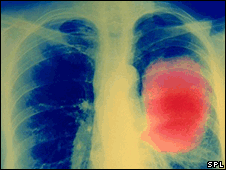| ||||||||||||||||||||||||||||||||||||||||||||||||||||||||||||||||||||||||||||||||
|
Controversial drug thalidomide does not improve survival for lung cancer patients, UK scientists say. 英国科学家称,有争议的药物萨立多胺并不能提高肺癌患者的生存机率。  Small cell lung cancer accounts for up to a fifth of all lung cancers The drug, banned after its use 50 years ago for morning sickness led to major birth defects(不正常发育), is being investigated as a cancer treatment. But the Journal of the National Cancer Institute reported this is not the case for small cell lung cancers and that it increases the risk of blood clots1(血块). However, experts said the drug is showing promise on other cancers. Thalidomide is an anti-angiogenic(抗血管生成) drug. This means it targets and suppresses the formation of new blood vessels3, which tumours4 need to survive and grow. Small cell lung cancers account for 15-20% of all lung cancers. Survival rates have barely changed in 25 years, with just 2% of those with extensive disease alive five years after diagnosis5. 'Closes the door' In the research by doctors at London's University College and Middlesex Hospitals, 724 patients with small cell lung cancer were studied. The work is thought to be the first fully6 randomised advanced study into using thalidomide to treat this kind of cancer. Half the patients were given chemotherapy(化学疗法) plus a daily dose of 100-200 milligrams of thalidomide, while the rest had chemotherapy plus a dummy7(虚拟的) pill. Patients were studied for up to two years. But at the end of the study, researchers found no evidence of any difference in survival times between the two groups. The average survival time for patients who received the dummy pill was 10.5 months, while for those who took thalidomide capsules(胶囊,太空舱), it was 10.1 months. However those who took thalidomide had double the risk of developing blood clots. Writing in the journal, the researchers led by Dr Siow Ming Lee said: "Despite preliminary(初步的,开始的) promising8 evidence and biological plausibility9(似有道理,善辩), thalidomide was not associated with any survival benefit." In the same journal, Dr Curzio Rüegg and Dr Solange Peters of the University of Lausanne in Switzerland says this study, along with other negative findings from previous research, should lead scientists to carry out more studies into both small cell lung cancer and the use of thalidomide to prevent blood vessel2 development. But they said it "definitely closes the door to using thalidomide in small cell lung cancer." Kate Law, Cancer Research UK's director of clinical research, said: "While it's disappointing that thalidomide doesn't seem to help lung cancer patients, this trial still represents a step forward in understanding how to treat the disease. "We need to know which drugs can help but we also need to be clear about which drugs don't help. And the only way to do this is to conduct large patient studies like this one." She added: "Thalidomide continues to show promise in treating a cancer of the bone marrow10 called myeloma(骨髓瘤) and it is being studied in a number of other cancers including mesothelioma(间皮瘤) [asbestos-related cancer] and prostate(前列腺) cancer." 点击  收听单词发音 收听单词发音
|
||||||||||||||||||||||||||||||||||||||||||||||||||||||||||||||||||||||||||||||||
- 发表评论
-
- 最新评论 进入详细评论页>>



